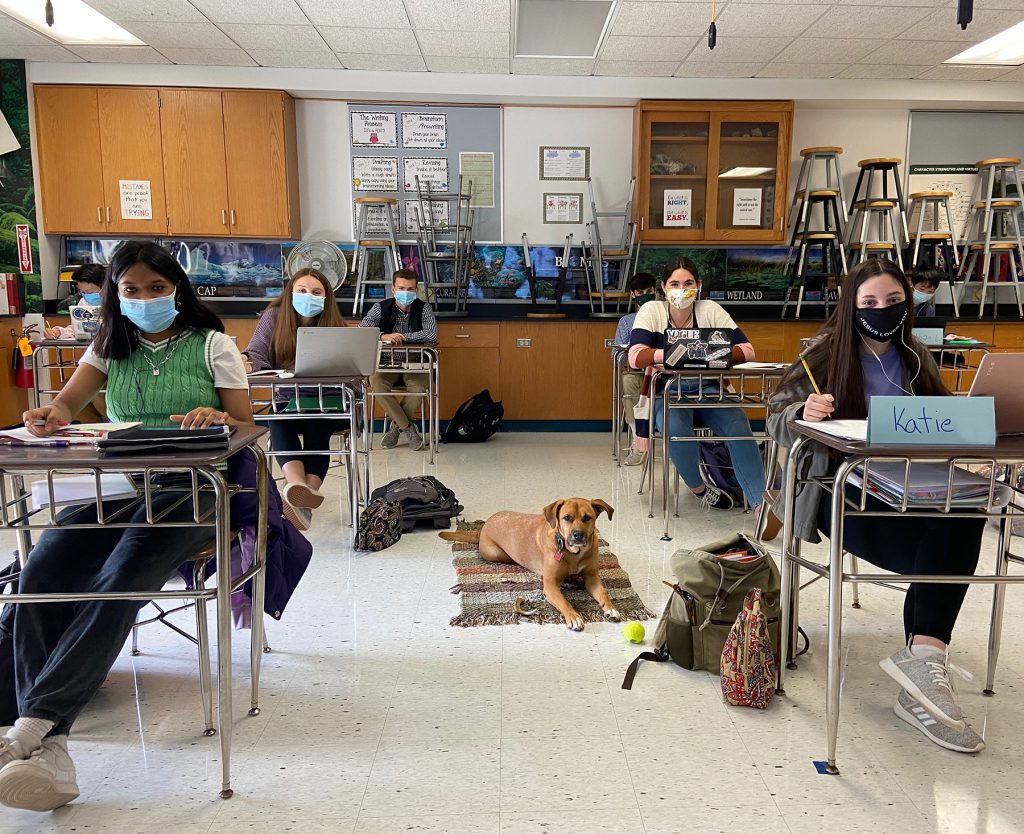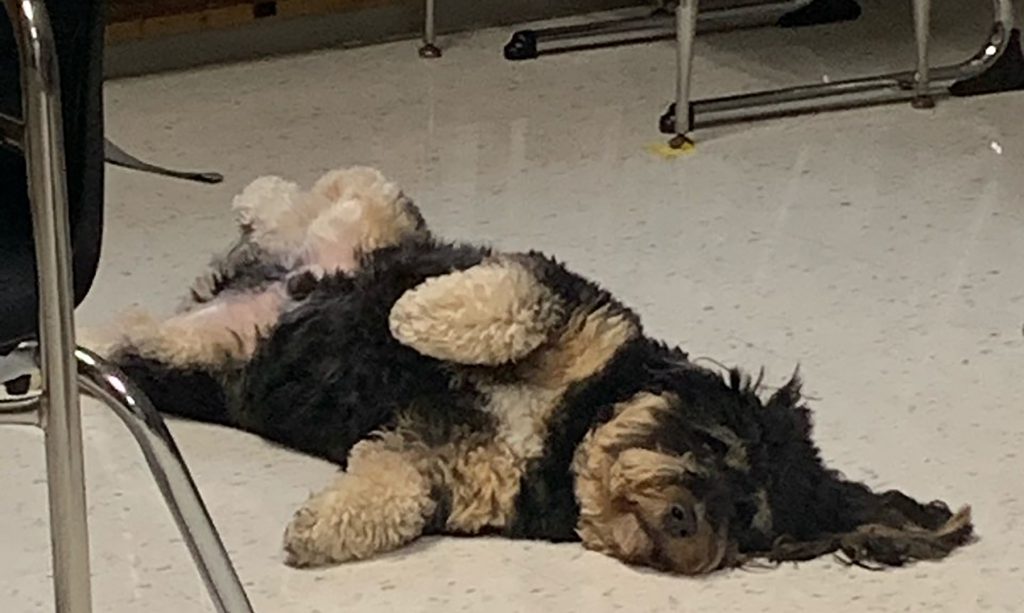
When Kiki walks the Fayetteville-Manlius High School halls, she often causes a stir among the students.
“Oh, look! There’s Kiki!” students say to one another as smiles light up their faces.
With her friendly disposition, Kiki is quick to walk over and say hello with a nudge of her nose and wag of her short tail. The 7-year-old cream-colored Cockapoo was the district’s first therapy dog, introduced to high school students and staff at the beginning of the 2019-20 school year.
Kiki, who belongs to computer science teacher Diane Gilbert, typically visits the high school twice per week. She spends time in Gilbert’s classroom, the Counseling Center, walking through the school hallways—always on a leash and accompanied by a staff member—and visiting classrooms at staff members’ requests with school counselor Dana Pierce, who was trained as Kiki’s secondary handler.
Pierce advocated for the program for several years. There are academic benefits of having children interact with therapy dogs, such as having students read or write letters to the dogs, but the advantages of having trained therapy dogs in schools go well beyond academics, according to Charlotte’s Litter, a nonprofit organization that promotes therapy dog programs.
“Research has demonstrated that therapy dogs properly managed in the school setting can not only make a measurable difference in terms of gaining various skills, such as reading enhancement, but also in contributing critically to emotional and relational development,” according to Charlotte’s Litter. “School counselors are finding that the presence of a therapy dog can decrease anxiety and enable students to work through issues such as anger management, bullying tendencies and other psycho/social problems.”
Across F-M, staff members have been focusing on supporting students’ mental health. The district’s strategic plan includes a focus on creating a positive school environment, and launching the therapy dog program is one way staff members are supporting students as students deal with increasing stress and anxiety.
With the F-M administration in support of the program, which is at no cost to the district since the participants are volunteers, Pierce just needed to find someone with a dog who was willing to go through the training and bring their dog to school.
When she learned that Gilbert was training Kiki to visit nursing homes and hospitals, Pierce asked her if she would be willing to have Kiki be the district’s first therapy dog.

Gilbert agreed, and Kiki’s presence in the building was so successful at meeting students’ and staff members’ social-emotional needs that the program expanded this school year to include two more dogs: Charlie, a 3-year-old Bernadoodle who belongs to English teacher Scott DeForest and Joey, a 5-year-old Black Mouth Cur, who belongs to biology teacher Kayla Cocquyt. Like Kiki, they spend the bulk of their time in their owners’ classrooms, visiting classrooms and going for walks in the hallways during class changes.
In the morning, Charlie and Kiki can sometimes be found outside with Assistant Principal Dr. Karen Liparulo, greeting students upon their arrival.
Kiki is again visiting the school twice per week this school year. Charlie is attending two to three times per week, and Joey visits weekly.
Each of the three dogs is certified through the American Kennel Club’s Canine Good Citizenship program, which is a 10-skill training program that focuses on good manners and obedience.
Contact with the dogs is voluntary, Pierce said. At the start of the school year, she emailed the high school staff, introducing the dogs and sharing their photos. She acknowledged that not all people are comfortable around or like dogs and some have allergies or other reasons they’d prefer not to welcome dogs into their spaces.
Pierce is careful to avoid classrooms where students or staff members have expressed that they do not want to be around the dogs.

“First and foremost, we just want everyone to feel safe,” she said.
As word of the program’s success has spread, the hope is that eventually each F-M school will have at least one therapy dog. Enders Road Elementary School is poised to join the program as one of its staff members currently has a dog going through the necessary training.
“It’s so clear that having therapy dogs in our building makes a positive difference in the daily experience of our students and staff,” Pierce said.
